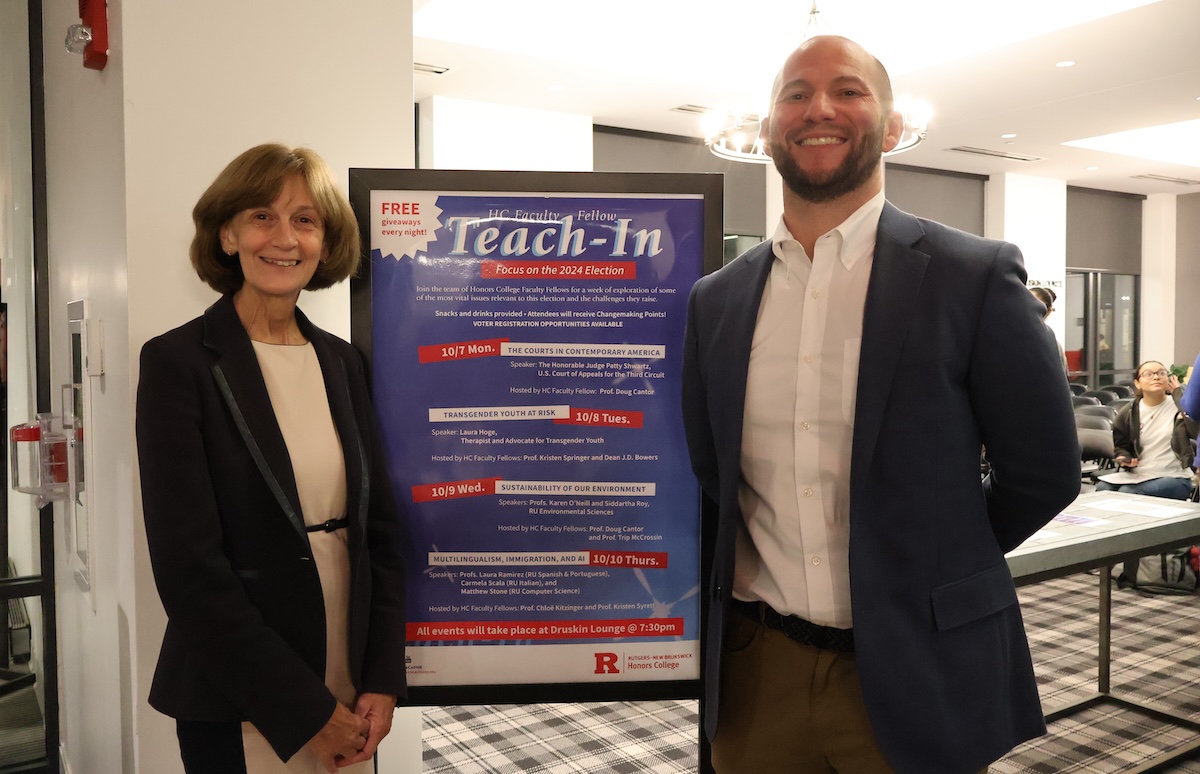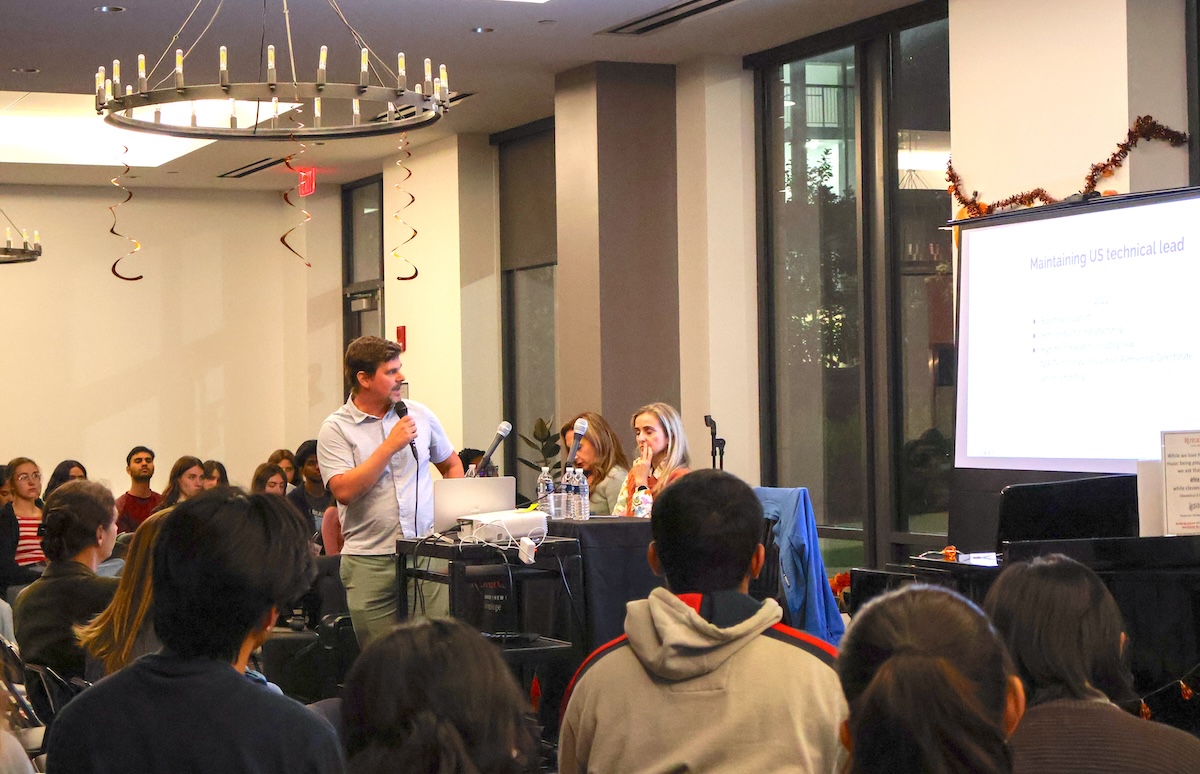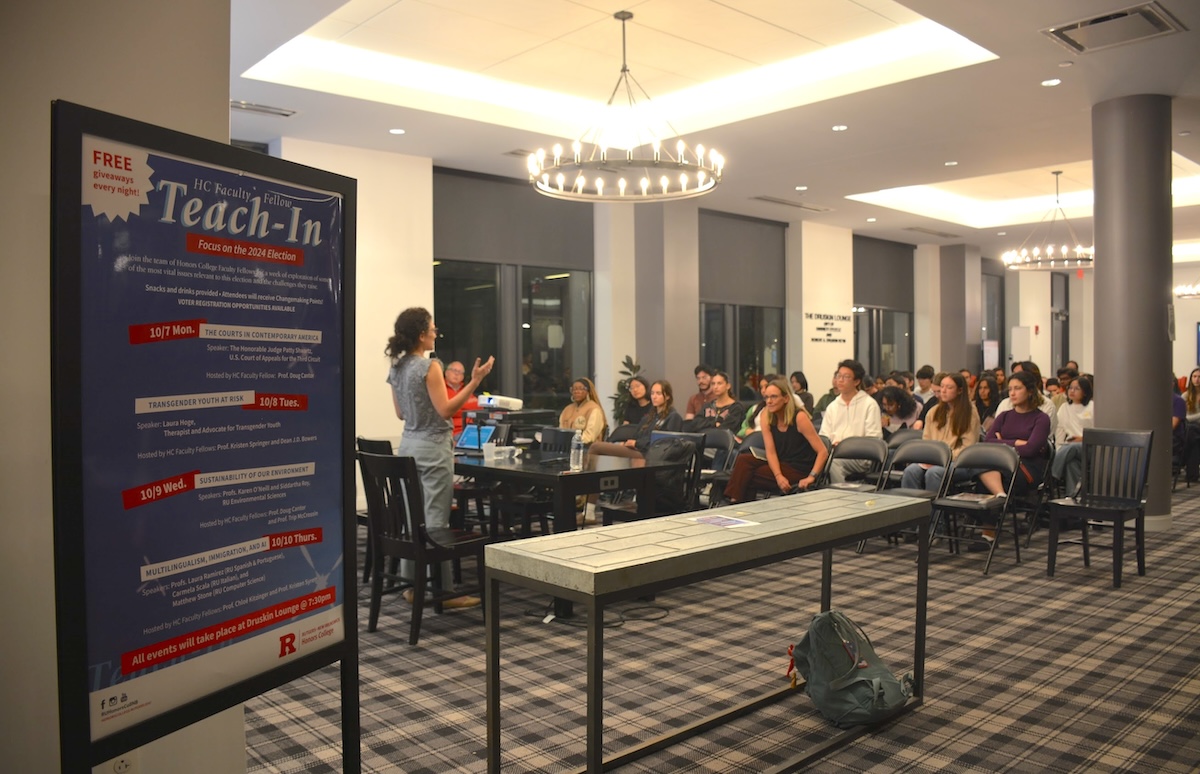From October 7 through 10, the Honors College Faculty Fellows hosted the first ever Honors College Teach-In as a way to connect with students and the issues that society is confronting. The goal was to encourage open dialogue and engage in respectful conversations.
This inaugural Teach-In focused on election topics, ahead of perhaps one of the most consequential elections of our lifetime. Not only is it the first time that many students are voting, but there are a variety of transformational issues on the ballot—overtly or covertly. The four-day series covered The Courts in Contemporary America, Transgender Youth at Risk, Sustainability of Our Environment, and Multilingualism, Immigration, and AI.
“In these polarizing times, sessions like these can help all of us to understand what is truly at stake with respect to these critical issues,” said the Faculty Fellows, reflecting on the Teach-In. “And real, sustainable change requires input, education, and buy-in across generations and disciplines.”
On Monday,...
the first night of the Teach-In hosted by Honors College Faculty Fellow Doug Cantor, Honorable Judge Patty Shwartz of the U.S. Court of Appeals for the Third Circuit discussed how elections affect the judicial and legal system. Judge Shwartz’ path to her position is a prime example of this. She was nominated by President Obama, but her nomination pended for 18 months due to the 2012 election cycle.
“I hope that students will realize that far more is at stake in an election than the presidential candidate you are voting for,” said Professor Cantor, Department of Political Science at the Rutgers School of Arts and Sciences, during the event. “You are also voting for their entire cabinet, who they will staff the Federal government's regulatory agencies with, and most importantly, the judges they will nominate to the Federal bench. And this isn't just Supreme Court justices; it's the hundreds of judges a president will nominate during their term(s).”
Judge Shwartz also noted that while judges are not involved in the political process, they make decisions that affect it. Throughout the discussion she noted that “elections have consequences” and that voting is key.
On Tuesday,...
hosted by HC Faculty Fellows Professor Kristen Springer and Dean J.D. Bowers, Laura Hoge, a therapist and advocate for transgender youth, highlighted what is at stake for transgender rights with this election. She spoke about combating the growing tide of anti-trans legislation on a state and federal level through increasing awareness and advocacy in support of protecting the rights of an already-vulnerable population.
Andrea Gonzalez (‘28, SAS/HC) said, “There’s a lot of anti-trans propaganda being spread based on false notions, and as voters, we need to take the initiative to research factual data that’s created by credible resources.”
Hoge reminded students of the importance of local and state organizations in moving legislation forward. While federal elections can be crucial for solidifying legislation, it can sometimes be more important to show solidarity and advocate for local legislation to show broader support for an issue.
On Wednesday,...
hosted by HC Faculty Fellows Professors Cantor and Trip McCrossin, Rutgers University professors in environmental sciences, Karen O’Neill and Siddartha Roy, discussed the state of environmental legislation and sustainability. Professor O’Neill noted that the climate crisis is science, not politics, but it has been weaponized in the political sphere. She argued that much of the existing discourse in the election has been largely symbolic rather than actionable.
Later on in the night, in his discussion of the Flint Water Crisis, Professor Roy spoke about the importance of teaching ethical conduct in science and politics. He further discussed how action requires that everyone does their part again reminding students that their vote is their voice, and it matters.
“You are not just voting on someone's personality or style of talking. You're voting on how we will regulate the water you drink and the air you breathe; the decisions on how we take care of those things are made by elected officials, not scientists,” said Professor Cantor. “Certain candidates are more likely to follow scientists' recommendations, and some are less likely, but at the end of the day the decisions get made by people in office. Learn what those issues are and why they matter, because they most certainly determine the type of future you are going to be living in.”
On Thursday,...
hosted by HC Faculty Fellows Professors Chloë Kitzinger and Kristen Syrett, Rutgers Professors Laura Ramirez (Spanish & Portuguese), Carmela Scala (Italian), and Matthew Stone (computer science) concluded the Teach-In series by presenting on the importance of multilingualism in America and ethical issues surrounding artificial intelligence. Although we are touched by these topics in our daily lives, the presenters reminded students about significant questions of promoting diversity and accessibility to people of different language backgrounds.
“Multilingualism and how much it affects the country is very important,” said Nkosazana Burke-Douglas, (‘28, SAS/HC). “We don’t focus on it as much as we need to, and we should push those initiatives for language-learning and give support for people who immigrate here.”
Students who attended the Teach-In affirmed the importance of their voices and votes in not only this year’s election, but to the democratic process as a whole. The Teach-In initiated many valuable conversations, reminded students of their role as future leaders, and showed the enthusiasm Honors College students have for creating a better world—around 70 students attended each night.
“We’re the students—the next generation—who are going to be in charge of this nation,” said Yangyang Hu (‘28, SAS/HC). “We need to know, and let others know, what the real situation is like, and encourage more engagement from the rest of the population.”
Finally, the Teach-In underlined the significance of every individual action. One student may not seem powerful on their own, but votes and advocacy from thousands of students can bring the nation to a brighter future.
“It is genuinely important to me to be able to be informed about these issues—elections, politics, and the judicial system—not only as a political science/pre-law student but also just as an American citizen,” said Alejandra Afanador (‘27, SAS/HC), who serves as an RU Voting Ambassador working to engage students in the voting process.
“Regardless of the extent to which you involve yourself in politics, these policies still affect us all. Therefore, I see much value in making the effort to educate oneself. We should never lose sight of the allure of being inquisitive and wanting to comprehend the grounds for standard modes of operation instead of blindly accepting them,” she added.
“Voting is the last step in a longer process and what you all must do is to become civic influencers, and that starts by doing the work,” said Dean Bowers. “Elections and voting are the end-goals of a much longer, thoughtful, designed set of plans and activities. Influence in politics is amassed, not assumed, and it comes from being present, from spreading the message through actions and activities, and from being involved. If, as one of our speakers noted, ‘elections have consequences’ then we also must note that ‘actions speak loudly.’”
“Statistics show that young people are generally the least likely demographic to vote in elections, and quite frankly, there are candidates out there who want to keep it that way,” said Professor Cantor. “Typically, younger demographics, notably the 18-25 age group, on average feel more ambivalent towards politics and like their votes may not matter. This could not be further from the truth. Your vote counts as much as someone in their 40s, 60s, or 80s. As Judge Shwartz repeatedly and eloquently put it: ‘Elections matter. Vote.’”


